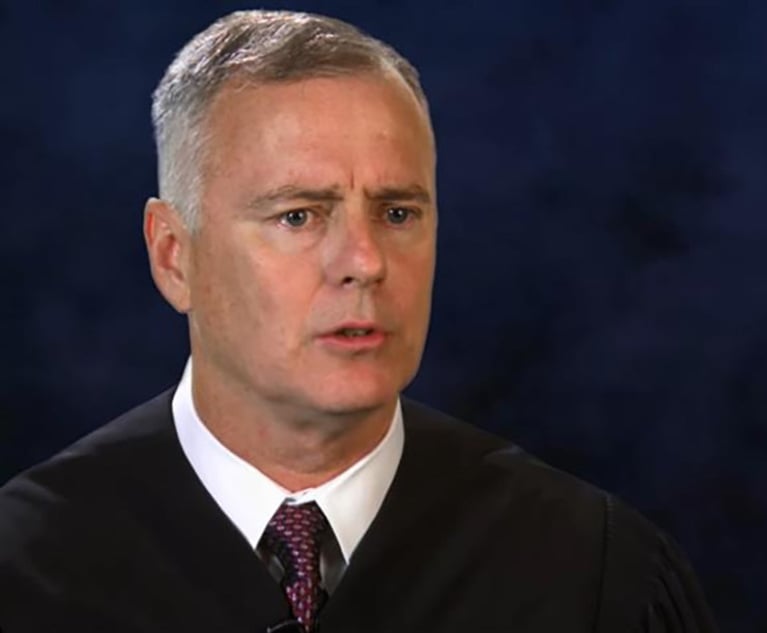 U.S. Labor Department headquarters in Washington, D.C. Credit: Mike Scarcella / NLJ
U.S. Labor Department headquarters in Washington, D.C. Credit: Mike Scarcella / NLJDon't Shortchange Workers on Short Breaks, DOJ Tells Supreme Court
Short breaks of 20 minutes or less are "properly understood to be part of the compensable workday," the U.S. Justice Department tells the U.S. Supreme Court.
May 09, 2018 at 03:46 PM
4 minute read
The U.S. Justice Department is arguing in a case at the U.S. Supreme Court that a group of workers at a Pennsylvania-based publishing company should be paid for breaks that last 20 minutes or less.
The company, American Future Systems Inc., which does business as Progressive Business Publications, is challenging a ruling by the U.S. Court of Appeals for the Third Circuit that said the Fair Labor Standards Act requires businesses to pay workers for breaks under 20 minutes. The Justice Department's brief, filed this week, supported the appeals court decision.
Progressive docked pay whenever a sales representative logged off a computer for more than 90 seconds, which included bathroom or coffee breaks. Progressive argues in its cert petition to the Supreme Court, filed by Drinker, Biddle & Reath, that federal courts are divided on how to interpret when a short break should be considered “work.”
Paid break time, according to Progressive's lawyers, should be determined based on “an assessment of all the facts and circumstances,” rather than the “bright-line rules advocated by the Labor Department.” Progressive argued that time spent logged off under its “flexible break policy” does not constitute work and that a fact-specific analysis should be used.
The Justice Department is asking the Supreme Court to keep in place the Third Circuit's ruling.
“Unlike meal periods, 'short' rest periods—that is, breaks of a 'short duration' up to '20 minutes'—have 'customarily [been] paid for as working time,' and are thus properly understood to be part of the compensable workday,” the Justice Department said in its filing. The government continued: “Such breaks as a class are logically understood primarily to benefit employers by enabling employees to maintain a higher degree of productivity throughout the workday.”
➤➤ Get employment law news and commentary straight to your in-box with Labor of Law, a new Law.com briefing. Learn more and sign up here.
The Justice Department disputed the company's assertion that federal appeals courts are divided, saying the FLSA is clear on the issue.
“The court of appeals correctly concluded that the short breaks in this case qualified as compensable work under the FLSA, and its decision does not conflict with any decision of this Court or any other courts of appeals. No further review is warranted,” the Justice Department's brief said.
Progressive, based in Malvern, Pennsylvania, publishes and distributes business-information publications through telemarketers who are paid an hourly wage and receive bonuses based on the number of sales they make when logged onto their workstation. On average, sales representatives are each paid for just over five hours per day at the federal minimum wage of $7.25 per hour.
Progressive's previous policy gave employees two 15-minute paid breaks per day. The company changed its policy in 2009 and eliminated the breaks but allowed employees to log off their computers at any time. Under the policy, the employees are only paid for the time they are logged on. The sales representatives would be docked for failing to work a certain number of hours and cannot work more than 40 hours per week.
The Labor Department in 2015 sued Progressive, claiming the company failed to pay the federal minimum wage to its employees because of its policy. The department argued that rest periods between five and 20 minutes are common in the industry and that “they promote the efficiency of the employee and are customarily paid for as working time.”
Progressive's case has not yet been set for conference at the Supreme Court.
This content has been archived. It is available through our partners, LexisNexis® and Bloomberg Law.
To view this content, please continue to their sites.
Not a Lexis Subscriber?
Subscribe Now
Not a Bloomberg Law Subscriber?
Subscribe Now
NOT FOR REPRINT
© 2024 ALM Global, LLC, All Rights Reserved. Request academic re-use from www.copyright.com. All other uses, submit a request to [email protected]. For more information visit Asset & Logo Licensing.
You Might Like
View All

Trump's Solicitor General Expected to 'Flip' Prelogar's Positions at Supreme Court

Auditor Finds 'Significant Deficiency' in FTC Accounting to Tune of $7M
4 minute read
Texas Court Invalidates SEC’s Dealer Rule, Siding with Crypto Advocates
3 minute readTrending Stories
- 1Commission Confirms Three of Newsom's Appellate Court Picks
- 2Judge Grants Special Counsel's Motion, Dismisses Criminal Case Against Trump Without Prejudice
- 3GEICO, Travelers to Pay NY $11.3M for Cybersecurity Breaches
- 4'Professional Misconduct': Maryland Supreme Court Disbars 86-Year-Old Attorney
- 5Capital Markets Partners Expect IPO Resurgence During Trump Administration
Who Got The Work
Michael G. Bongiorno, Andrew Scott Dulberg and Elizabeth E. Driscoll from Wilmer Cutler Pickering Hale and Dorr have stepped in to represent Symbotic Inc., an A.I.-enabled technology platform that focuses on increasing supply chain efficiency, and other defendants in a pending shareholder derivative lawsuit. The case, filed Oct. 2 in Massachusetts District Court by the Brown Law Firm on behalf of Stephen Austen, accuses certain officers and directors of misleading investors in regard to Symbotic's potential for margin growth by failing to disclose that the company was not equipped to timely deploy its systems or manage expenses through project delays. The case, assigned to U.S. District Judge Nathaniel M. Gorton, is 1:24-cv-12522, Austen v. Cohen et al.
Who Got The Work
Edmund Polubinski and Marie Killmond of Davis Polk & Wardwell have entered appearances for data platform software development company MongoDB and other defendants in a pending shareholder derivative lawsuit. The action, filed Oct. 7 in New York Southern District Court by the Brown Law Firm, accuses the company's directors and/or officers of falsely expressing confidence in the company’s restructuring of its sales incentive plan and downplaying the severity of decreases in its upfront commitments. The case is 1:24-cv-07594, Roy v. Ittycheria et al.
Who Got The Work
Amy O. Bruchs and Kurt F. Ellison of Michael Best & Friedrich have entered appearances for Epic Systems Corp. in a pending employment discrimination lawsuit. The suit was filed Sept. 7 in Wisconsin Western District Court by Levine Eisberner LLC and Siri & Glimstad on behalf of a project manager who claims that he was wrongfully terminated after applying for a religious exemption to the defendant's COVID-19 vaccine mandate. The case, assigned to U.S. Magistrate Judge Anita Marie Boor, is 3:24-cv-00630, Secker, Nathan v. Epic Systems Corporation.
Who Got The Work
David X. Sullivan, Thomas J. Finn and Gregory A. Hall from McCarter & English have entered appearances for Sunrun Installation Services in a pending civil rights lawsuit. The complaint was filed Sept. 4 in Connecticut District Court by attorney Robert M. Berke on behalf of former employee George Edward Steins, who was arrested and charged with employing an unregistered home improvement salesperson. The complaint alleges that had Sunrun informed the Connecticut Department of Consumer Protection that the plaintiff's employment had ended in 2017 and that he no longer held Sunrun's home improvement contractor license, he would not have been hit with charges, which were dismissed in May 2024. The case, assigned to U.S. District Judge Jeffrey A. Meyer, is 3:24-cv-01423, Steins v. Sunrun, Inc. et al.
Who Got The Work
Greenberg Traurig shareholder Joshua L. Raskin has entered an appearance for boohoo.com UK Ltd. in a pending patent infringement lawsuit. The suit, filed Sept. 3 in Texas Eastern District Court by Rozier Hardt McDonough on behalf of Alto Dynamics, asserts five patents related to an online shopping platform. The case, assigned to U.S. District Judge Rodney Gilstrap, is 2:24-cv-00719, Alto Dynamics, LLC v. boohoo.com UK Limited.
Featured Firms
Law Offices of Gary Martin Hays & Associates, P.C.
(470) 294-1674
Law Offices of Mark E. Salomone
(857) 444-6468
Smith & Hassler
(713) 739-1250








